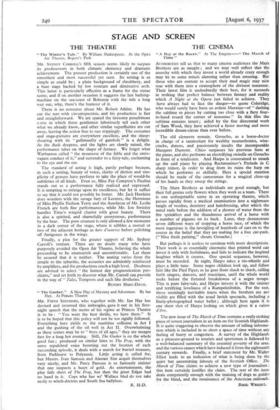THE CINEMA AUTHORITIES tell us that to many cinema audiences
the Marx Brothers are as naught ; and we may well reflect that the anarchy with which they invest a world already crazy enough may be to some minds alarming rather than amusing. But those who are content to accept their mad magic may now soar with them into a stratosphere of the divinest nonsense. Their latest film is undoubtedly their best, for it succeeds in striking that perfect balance between fantasy and reality which A Night at the Opera just failed to achieve. They have always had to face the danger—to quote Coleridge, who would surely have been an ardent Marxian—of " dashing the sublime to pieces by cutting too close with a fiery four- in-hand round the corner of nonsense." In this film the sublime remains intact ; aided by the fine directorial work of Sam Wood, they have achieved a faster moving and more incredible dream-circus than ever before.
The old elements remain. Groucho, as a horse-doctor in charge of a sanatorium for wealthy neurasthenics, wise- cracks, dances, and passionately insults the incomparable Margaret Dumont. Chico surpasses his previous feats at the piano, and also performs an electrifying swindle on Groucho in front of a totalisator. And Harpo is constrained to smash up the said piano by playing Rachmaninov's Prelude in C sharp minor, in order to drag from its ruins the harp on which he performs so skilfully. Here a special mention should be made of the cameraman for a magical close-up of his hands as they sweep the strings.
• The Marx Brothers as individuals are good enough, but their full genius only flowers when they work as a team. There is one unforgettable scene in an operating theatre, which passes rapidly from a medical examination into a nightmare tangle of voodoo, dentistry and hairdressing, after which the mind reels before the addition of a shower of water from the fire sprinklers and the thunderous arrival of a horse with a number of pigeons on its back. Later, they demonstrate seven different ways of stopping a horse race, of which the most ingenious is the inveigling of hundreds of cars on to the course in the belief that they are making for a free car-park. (" Nice fresh parking," shouts Groucho.)
But perhaps it is useless to continue with mere descriptions. Their work is so essentially cinematic that printed word can invest it only with foolishness, and fails to indicate the inspired laughter which it creates. One special sequence, however, must be recorded. At night, Harpo takes a tin-whistle and plays a little tune. Some negro children look up, and follow him like the Pied Piper, as he goes from shack to shack, calling forth singers, dancers, and musicians, until the whole world rocks before the frenzied breakdowns of a negro troupe. This is pure fairy-tale, and Harpo invests it with the sinister and terrifying loveliness of a Rumpelstiltskin. For the rest, those seemingly inevitable tracts when the brothers are not visible are filled with the usual lavish spectacle, including a finely-photographed water ballet ; although here again it is one short shot of Harpo looking on which gives it a raison
d'être. .
The new issue of The March of Time contains a really striking piece. of screen journalism in an item on the Scottish Highlands. It is quite staggering to observe the amount of telling informa- tion which is included in so short a space of time without any feeling of hurry or congestion. IV survey of the Highlands as a pleasure-ground to tourists and sportsmen is followed by a well-balanced summary of the essential poverty of the area, and the various causes which have induced it from the eighteenth century onwards. Finally, a brief statement by Mr. Walter Elliot leads to an indication of what is being done by the qUiet but unremitting labours of the Scottish Office. The March of Time claims to achieve a new type of journalism ; this item certainly justifies the claim. The rest of the issue deals competently enough with. the training of dogs as guides for the blind, and the renaissance. of • the . American railroads.
BASIL• WRIGHT.






































 Previous page
Previous page